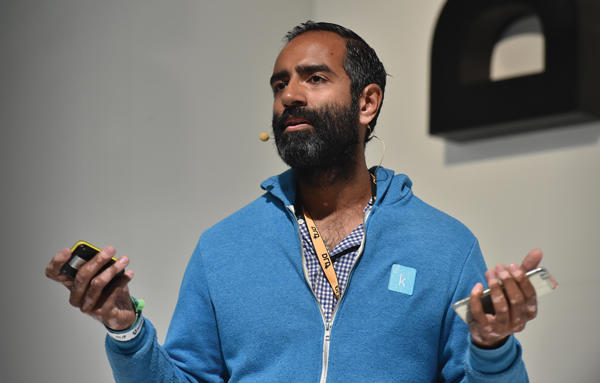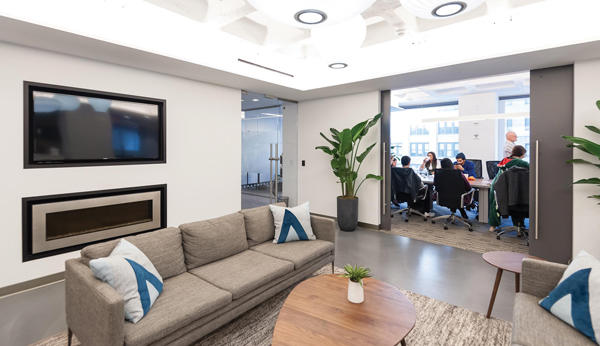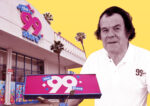Trending
The little flexible office startup that could
Inside Knotel’s swift rise as the three-year-old company co-founded by Amol Sarva goes head to head with industry giant WeWork

Amol Sarva has a way of saying things that can make you think: Did I just hear that right?
In early 2017, when barely anyone knew of his flexible office startup, Knotel, he told The Real Deal, in the casual tone of someone commenting on the weather, that he intends to “build a vast global enterprise.” A little more than a year later, he elaborated that he envisions a future in which “Knotel sprawls across virtually every block in every city.”
“It’s not possible to overstate our ambition for New York,” Sarva said in an interview last month. “We’re north of 40 properties now in New York, and there will be hundreds and hundreds.”
And don’t get him started on the competition.
He’s accused WeWork employees of corporate espionage and occasionally parks a bus outside that company’s headquarters painted with Knotel’s logo and the words “graduate from coworking.” He recently described that move as a message to “the bros hanging out doing keg stands at WeWork.”
Sarva called his competitor’s tendency to branch out into side businesses (including gyms and grade schools) “appalling.”
“If I were a shareholder there, I’d be embarrassed by the way these guys are wasting their time and management attention and, of course, ultimately the money,” he said.
Sarva’s friends call him blunt. His competitors call him abrasive. But he isn’t just all talk. Knotel — which takes unoccupied office space and sublets it to companies under flexible leases — has grown from a two-man outfit to a team of 150 employees that recently expanded outside of the city. Since the company announced a $25 million Series A funding round early last year, it has increased its footprint to 45 locations in New York, San Francisco and London, spanning more than 800,000 square feet.
And just last month, Knotel raised $70 million in a new funding round from real estate firms Newmark Knight Frank, the Sapir Organization, the Moinian Group, the Wolfson Group and Wainbridge Capital, giving it a $500 million valuation. The startup also recently announced plans for a blockchain-based office leasing database.
Knotel isn’t a vast global enterprise yet, but it managed to become the city’s third-largest flexible office space operator, behind WeWork and IWG (formerly known as Regus), at a dizzying speed. By the end of the year, Sarva’s company hopes to occupy nearly 2 million square feet — a lofty goal with big implications for the future of office leasing.
 Shared and flexible office space providers leased a record 858,546 square feet in Manhattan during the first quarter of 2018, more than triple the volume from a year earlier, per a recent Cushman & Wakefield report.
Shared and flexible office space providers leased a record 858,546 square feet in Manhattan during the first quarter of 2018, more than triple the volume from a year earlier, per a recent Cushman & Wakefield report.
“I think that the future of that flexible work environment is here to stay,” said Newmark’s CEO, Barry Gosin. “There’s a place for WeWork and there’s a place for Knotel. There’s room for both.”
Don’t call it “co-working”
When Sarva and his peers talk about the latest shifts in office leasing, they often point to the historical changes that have redefined hotels.
More than a century ago, the hospitality industry was highly fragmented. Property owners would run their own independent hotels or lease their buildings to outside hospitality managers and operators.
But in the second half of the 20th century, global brands like Marriott and Hilton took off and began operating hundreds of hotels with nearly uniform design and service across multiple continents. In order to do so, those brands sign detailed management agreements with building owners and form partnerships with development firms for new hotel properties.
Now that flag concept is spreading over to the office market.
Firms including WeWork, IWG, Knotel and the New York-based co-working startup Industrious have built large consumer-facing brands with extensive networks of flexible office spaces in all kinds of markets. The pitch is that small businesses, freelancers and even some major corporations like IBM and Amazon appreciate a flexible lease that allows them to move into a furnished and fully serviced office on short notice without having to pay for a broker. Users (or members, as WeWork calls them) can then expand or downsize without a hassle or extra fees as their business changes.
The growing number of flexible office space startups are “solving the exact same problem with slightly different solutions,” said Jonathan Wasserstrum, who runs the tech-centric office leasing brokerage TheSquareFoot.
But there are notable differences in their philosophies.
WeWork, now valued at $20 billion, calls itself a community business, and its basic premise is that most people crave companionship and want to be around like-minded peers. So the eight-year old firm provides offices with expansive lounges and communal tables along with dorms for adults, a networking app, gym classes, social events and an annual summer camp. WeWork, by most accounts, wants to be an antidote to loneliness in the digital age.
Knotel, on the other hand, doesn’t care nearly as much about community. It doesn’t refer to its customers as members, it doesn’t cater to freelancers, and Sarva refuses to call the business “co-working.” Knotel’s basic premise is that the traditional lease model, with all its restrictions and upfront costs, doesn’t work for many companies. Rather than community, it advertises “agility.”
“Companies run in agile ways now,” Sarva said. “But their real estate does not.”
Survival of the barest?
A desk at Knotel costs about $10,000 a year on average, which is roughly in line with the advertised prices for private offices at competing firms, and Sarva said most of the company’s tenants occupy about 100 square feet per employee.

A promotional photo of one of Knotel’s office spaces
More than half of Knotel’s spaces are leased from landlords, but the company prefers management agreements — which generally include management fees, profit sharing and no rent.
And while most flexible office startups spend a lot of time and money on building out and furnishing spaces to give them a uniform look, Knotel’s construction work is bare-bones. Its spaces include conference rooms, Wi-Fi, furniture, perhaps a paint job and a few name tags, but every location looks different. It’s possible to walk into a Knotel office space without immediately realizing it.
But less interior construction allows Sarva’s firm to expand more quickly and cheaply than it would otherwise. That strategy is also meant to appeal to cost-conscious landlords and companies that want their space to look like their own office rather than a typical co-working setup.
“All WeWork locations have the same look and design; they are carbon copies,” said developer Cynthia Schlegel, whose company EcoRise Development is partnering with Knotel on the construction of an office building in Gowanus, Brooklyn. “You are stamping the space with the WeWork brand, not designing for the identity of the occupant.”
A representative for WeWork declined to comment.
Sarva maintained that retailers like the Body Shop — one of Knotel’s tenants — don’t want to “work under the blinking lights of someone’s bro-deco design.”
Zach Aarons, co-founder of the real estate tech accelerator and advisory firm MetaProp NYC, said Knotel’s minimal-buildout model offers more immediate access. “If you do an enterprise deal with WeWork, you may not be able to move in for a while,” he noted, referring to the co-working giant offering to build out custom spaces for companies. “If you do an enterprise deal with Knotel, you can move in tomorrow.”
But Sarva’s approach also carries risks. Spending less on construction, for one, means some locations may look worse than others. “The biggest disadvantage is the aesthetic,” Aarons said. The extent of that, of course, differs from building to building and even city to city.
Knotel now has three offices in San Francisco and one in London on top of its three dozen locations in New York, and is looking to expand to more markets. As it adds locations, making sure each one meets its customers’ standards becomes more challenging.
Roy Bahat, head of the venture fund Bloomberg Beta and an early investor in Knotel, said the “balance is always how fast to grow.” Grow too quickly and you may end up with a bad product, he noted. Grow too slowly, and you may fall behind your competitors for good.
If Knotel’s investors believe the company will get that balance right, that has a lot to do with their faith in Sarva and the company’s other founder, Edward Shenderovich, an entrepreneur who also started the venture capital firm Kite Ventures.
Newmark’s Gosin said his company, which recently went public, had been considering investing in a co-working startup for three to four years and met with several founders. “I was never as impressed right out of the gate as I was with them,” he said about Sarva and Shenderovich.
Bahat, who has known Sarva since high school, said he “basically begged” Knotel’s co-founder to let him invest and described Sarva as a natural entrepreneur.
“He’s like a heat-seeking missile for going after the big goal,” Bahat said.
K is for Knotel
Amol Sarva grew up in Jamaica and Little Neck, Queens. His father, an Indian immigrant, worked as an accountant. On the side, he assembled a multifamily portfolio in the borough that included more than 500 apartments at its peak.
“We’ve always been in and around [real estate],” said Sarva’s brother Paraag, who founded the rental insurance startup Rhino, manages the family’s properties and is developing a 53,000-square-foot rental building at 109-19 72nd Road in Forest Hills.
After graduating from Stuyvesant High School, where he was a national debating champion, Sarva spent close to a decade doubling as an entrepreneur and an academic. At Columbia College in the mid- to late ’90s, he got his start as an entrepreneur. And while studying for a philosophy Ph.D. at Stanford University, he became a founding member of mobile phone startup Virgin Mobile USA. He left the company in 2002 and spent three years at the management consulting firm McKinsey & Company before the entrepreneurial world pulled him back in.
In 2007, Sarva founded Peek, a smartphone producer; he ran it until selling it to the mobile internet joint venture Bharti SoftBank in 2012. In his spare time, he co-developed the 13-unit condo building East of East at 13-14 Jackson Avenue in Long Island City with several partners. The late New York Daily News reporter Jason Sheftell called the rusty steel-covered building — which was completed in 2012 — architecturally the “most important new building in the borough.” Architect Brian Ripel, who designed East of East, said the “intent was drama.”
In 2014, Sarva also published the children’s book “Q is for Queens,” which has drawings of people, buildings and objects associated with Queens for each letter of the alphabet.
That June, he heard a presentation by Lee von Kraus, a neuroscientist who was working on cybernetics technology. Sarva was intrigued, according to von Kraus, and within a year they co-founded the cybernetics startup Halo Neuroscience. One of the company’s products is a headset that sends electrical currents into the brain to better connect it to muscles. Sarva still sits on Halo’s board.
The startup occupied an office at 33 West 17th Street but was left with plenty of excess space. So Sarva began subletting.
“I remember him observing how other companies work in the space and how to optimize it,” von Kraus said. They started hanging dividers from the ceiling that “psychologically broke up the room” without having to build actual walls. These curtain-like dividers later became a staple of Knotel’s spaces.
And eventually, the side gig became Sarva’s main business. In 2015, he and Shenderovich launched Knotel, and 33 West 17th was its first location.
“When we got started, we really didn’t realize how far up the curve of office customers we could go,” Sarva said, noting that the startup focused on businesses with 10-plus employees early on. “We just thought: Well, not everyone can build their business in a professional suite or co-working cubicle.”
Heated rivalry
Today, companies that sign up with Knotel have more than 50 employees on average, according to Sarva. Public firms including Starbucks and Microsoft are tenants, and the biggest company office managed by Knotel spans more than 20,000 square feet.
Sarva said Knotel is benefiting from what he calls corporate disaggregation.
“There no longer are these huge 10,000-person divisions that all roll up to some vice president that has five floors of a building and the next floors are some other vice president,” he said. “Corporates look like constellations of smaller companies working on many different projects.”
And Knotel wants to house them.
As the startup made inroads in the market for small and midsized headquarters and corporate divisions, WeWork reacted by courting those customers more aggressively as well, sources say. Apart from being one of Adam Neumann and Miguel McKelvey’s most serious rivals in New York, Sarva is also the only one who can compete with the WeWork co-founders in terms of height — he stands an unapologetic 6-foot-3.
In the second half of last year, WeWork, fresh off a $4.4 billion funding round from SoftBank, began offering free rent to tenants at Knotel and other flexible office companies if they switched over. But Sarva claims he didn’t lose a single customer.
Knotel also alleged last fall that two WeWork employees visited seven of its locations under fake names, posing as entrepreneurs looking for space in a “systematic attempt to pilfer Knotel’s proprietary information and trade secrets.”
Knotel sent WeWork a cease-and-desist letter in October, but that wasn’t the only response. In September, the first school bus, painted gray with Knotel’s logo and the “graduate from coworking” message on its side, parked outside of WeWork’s headquarters at 115 West 18th Street. In February, a bus appeared at the same spot, this time painted blue.
And on a recent Tuesday, TRD spotted a Knotel bus driving down 34th Street and emailed Sarva to see what he is using it for. “Telling people to graduate from coworking,” he responded within minutes. “Events and tours, too.”
Blockchain ambitions
In late March, Sarva sent an email to partners, clients and acquaintances announcing a new venture: Knotel Koin. A white paper on the project’s website claimed it “will ultimately provide the best data set in the commercial real estate market, on a global scale.”
Sarva envisions it as a crowdsourced office listing service based on blockchain technology. Brokers and landlords can add information, for example, on the size of an office space or its rent history to the network. The blockchain’s ledger system then verifies the data’s accuracy. Those who provide information will be rewarded with Knotel Koin — a cryptocurrency that gains in value as the database grows.
Sarva claims Knotel won’t make any money off the venture but said the goal is to help improve the real estate industry by making data more widely available. “The industry is full of transaction costs, and the transaction costs mostly go toward paying for the truth,” he said.
That ambition is bound to collide with CoStar’s. The Washington, D.C.-based firm built a near monopoly on office listing information and charges hefty fees for access to its database. Sarva insisted that CoStar stands to gain from his venture because it controls the most data, which it can trade in for Knotel Koin.
But CoStar may not see it that way.
The famously litigious company, which had a market cap of $13.9 billion as of April 26, hasn’t taken kindly to crowdsourced data startups in the past. In 2014, for example, it sued users of the leasing comp database CompStak, alleging they had uploaded information that belonged to CoStar. A year later the 21-year-old company, led by its founder, Andrew Florance, sued RealMassive — another database that allows users to trade information — for copyright infringement.
“He poked the bear,” MetaProp’s Aarons said about Sarva. Aarons argued that the blockchain database is still worth a try, though.
“He’s a big publicity stunt guy, right?” he said, pointing to the Knotel bus. “It’s almost a no-lose proposition for him to do this, so he might as well give it a shot. And if he’s successful, then holy shit, he’s won. Then he’s built a multibillion-dollar enterprise.”




